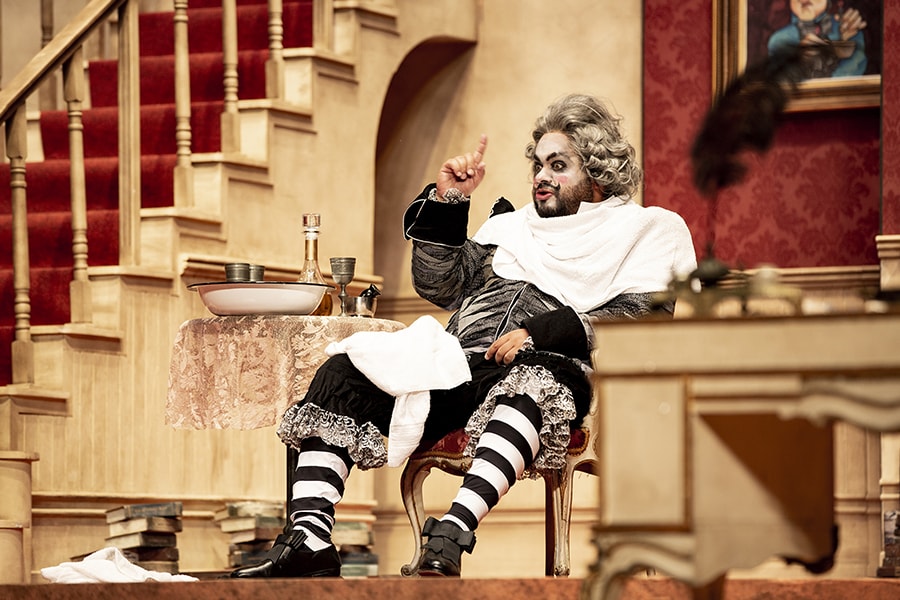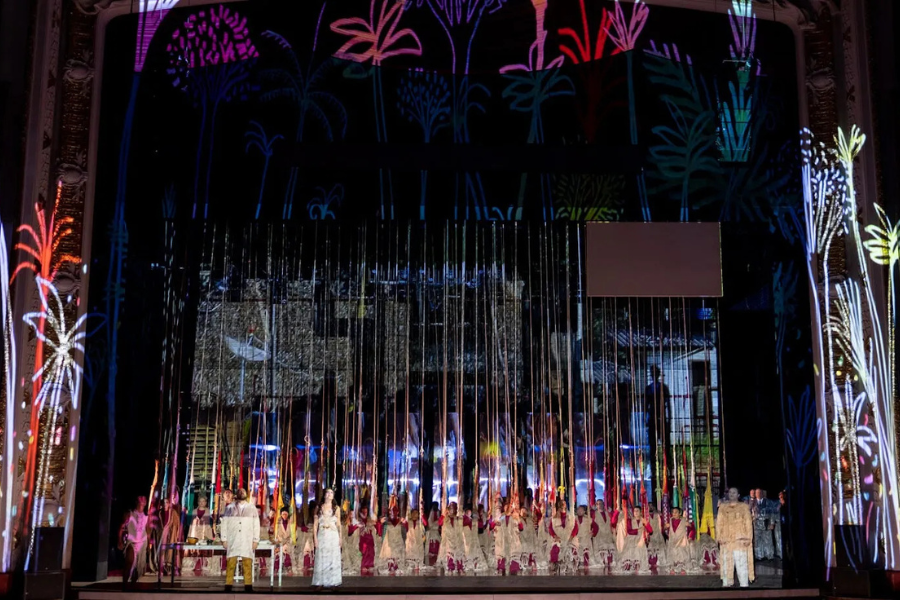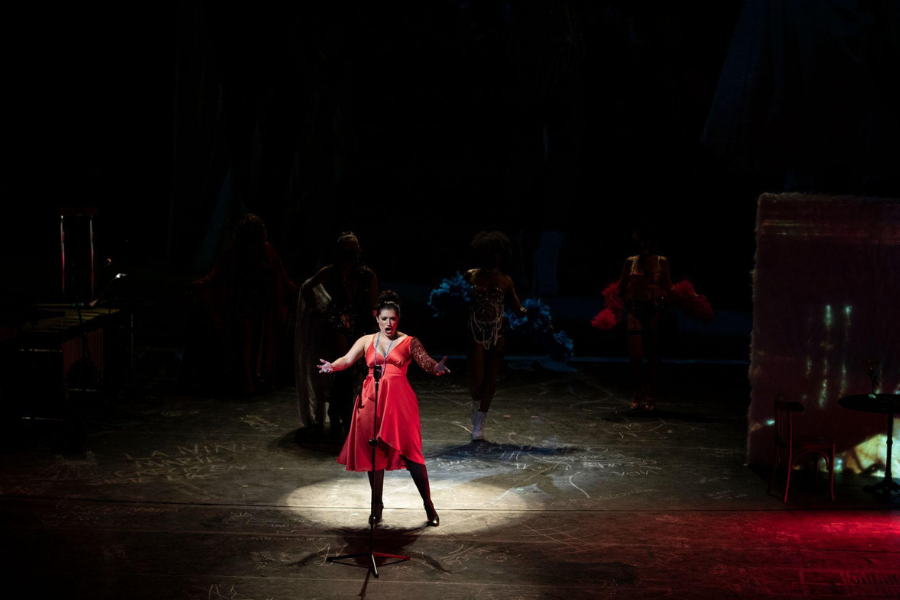Theatro Municipal de São Paulo inicia su Temporada de Ópera 2019 con el estreno de El barbero de Sevilla

El Theatro Municipal de Sao Paulo comienza su temporada de ópera 2019 con la ópera buffa por excelencia El Barbero de Sevilla de Rossini, desde este 14 al 21 de febrero bajo la dirección musical de Roberto Minczuk y la régie de Cleber Papa.
La temporada operística 2019 del Teatro Municipal de São Paulo comienza con una de las más famosas óperas cómicas: El barbero de Sevilla. (Il barbiere di Siviglia) de Gioachino Rossini, bajo la dirección musical de Roberto Minczuk, escénicas y trajes y escenarios de Cleber Papa firmados por José de Anchieta. Las funciones se realizan los días 14, 15, 16, 19, 20 y 21 a las 8:00 pm, y el día 17 a las 6 pm.
En la trama, el Conde de Almaviva se enamora de Rosina. Sin embargo, la joven tiene un tutor, el Dr. Bartolo, que la mantiene atrapada dentro de la casa, rodeada de sirvientes y músicos. Para acercarse a la amada, Almaviva confía en la ayuda de Figaro, que le vende pelucas a Rosina y le hace el cabello y la barba a Bartolo. De esto, surgen varios planes fantasiosos e hilarantes que han divertido al público durante más de 200 años.
El barítono Michel de Souza será Figaro, habiendo interpretado ya el Conde de Almaviva por la Ópera de Escocia en la ópera Las bodas de Figaro, de Mozart. David Marcondes se turna con él. Marcondes es miembro del Coro Municipal de Lírica de São Paulo y, en los últimos años, el barítono ha destacado en los papeles: Marullo, en Rigoletto (2014), Amonasro, Aida (2015) y Zurga, Os. Pescadores de perlas (2017).
El tenor Jack Swanson (Conde de Almaviva) hace su debut en América Latina. A los 26 años, nativo de Minnesota (Estados Unidos), Swanson está creciendo en el mercado internacional. Después de la Beca de Estudio Sara Tucker, recibió las Becas de Estudio y Carrera de la Fundación de Música Richard Tucker, un importante premio otorgado a los jóvenes cantantes al inicio de sus carreras.
Entre los recién llegados a la ópera en el Theatro Municipal de São Paulo están Anibal Mancini (Conde de Almaviva) y las sopranas Débora Dibi y Denise Yamaoka, quienes se turnan en el papel de Berta.
Al igual que el Dr. Bartolo, está el bajo Sávio Sperandio. Con experiencia en el papel, ha interpretado al mismo personaje en el Teatro Colón de Buenos Aires (2005), el Festival de Ópera de Ercolano / Italia (2007) y el Teatro Real de Madrid (2008). Alternan el papel con el cantante Saulo Javan. Ya ha aparecido en el Theatro Municipal de São Paulo en las óperas The Rake’s Progress, Don Giovanni, La Bohème, Falstaff, Salomé, entre otras.
SOBRE LA PRODUCCIÓN
El trabajo de Gioachino Rossini debutó en 1816. Con un libreto del escritor italiano Cesare Sterbini, está inspirado en una obra del artista francés Pierre Beaumarchais. Esta ópera fue puesta en escena en el Municipal por última vez en 1995. En más de 100 años, la escena histórica de São Paulo acumula alrededor de 36 asambleas. Según el director de orquesta Roberto Minczuk, el éxito mundial de la obra se debe a su ligereza. También señala algunas características de la composición. «La música es virtuosa e impresiona con rápidos pasajes técnicos, tanto por parte de los solistas como de la orquesta. Es interesante que use los instrumentos, la trompa, la flauta, el clarinete, de manera vocal y las voces de manera instrumental cuando Él quiere el virtuosismo, la articulación y la emoción que pide la historia «, completa Minczuk.
Para el programa Ópera Curta, de la Secretaría de Cultura del Estado, el director Cleber Papa ha vuelto a leer The Barber of Seville. Una de las diferencias de la asamblea en el Teatro Municipal será una vestimenta nueva para algunos personajes considerados «secundarios». «No estamos reinventando la ópera, sino creando situaciones que encajan perfectamente con la forma en que se cuenta la historia propuesta por el compositor. Traje mi versión de las razones que llevaron al personaje Ambrogio a tener tanto sueño y amplió la presencia escénica de Berta, una La criada que gana otras dimensiones en el espectáculo «, añade.
Papa invitó al director, escenógrafo y diseñador de vestuario José de Anchieta para esta producción. «Me complace enormemente trabajar con él, especialmente por ser un artista de mucha trayectoria. Le propuse que nos moviéramos a una abstracción escenográfica que recreara el ambiente de Sevilla (incluso tiene una bandera andaluza), con sus ups y bajadas, balcones, grandes ventanales, etc. «, dice. Los dos actos se dividen entre una villa en Sevilla y la casa de Rosina.
En total, hay 75 trajes en esta producción. «En cuanto a la vestimenta, no intenté atenerme a 1890, 1870. ¡Lo mezclé! Lo llevé un poco más lejos y logré algunos avances para no quedarme atrapado en una época. Cleber quería algo más sencillo, creativo, Sin embargo, tengo los elementos básicos de la temporada: los abrigos, los gibones, los pantalones cortos, los zapatos «, explica Anchieta, quien firma el escenario y el vestuario.
La comedia de esta ópera se traslada a la ropa. Los disfraces tendrán una huella similar a la de un circo, como medias de rayas de colores, que los artistas incluso usarán en el escenario con discrepantes parejas. «Les pido a los visagistas que exageren un poco más en la peluca, la línea Tim Burton, la línea Fellini. Tenga un tratamiento de invención, creación, no sólo permanezca en la peluca tradicional», agrega. Algunas telas se hicieron utilizando la técnica del patchwork (unión de telas con formatos variados).
Una de los personajes con más cambios de vestuario es Rosina, que utiliza de cinco a seis diferentes en la producción y también cambios de pelucas. «Un atuendo básico y ella usa faldas superpuestas», explica Anchieta. Eso es porque, como «prisionera», las obras de teatro son una forma de que ella exhiba su fortuna.
Dirección musical: Roberto Minczuk
Dirigida por: Cleber Papa
Escenarios y disfraces: José de Anchieta
Diseño de vestuario: Emilia Reily
Regente del coro de la lírica municipal: Mário Zaccaro
Con orquesta sinfónica municipal
Coro lírico
SOBRE CLEBER PAPA
Con formación inicial en Comunicación (FAAP), Cleber Papa estudió Pintura y Escultura, Diseño, Dirección de Producción de Cine y TV y Piano y Teoría Musical como actividades complementarias. Tiene un MBA en Economía de la Cultura (FGV – SP). Desarrolla trabajos permanentes de investigación y actualización en las áreas de Música, Teatro y Ópera, Historia del Arte y las interfaces del pensamiento contemporáneo. Desde los años 70 hasta los 90, Cleber Pope se dedicó a actividades relacionadas con la publicidad y la propaganda. Desde la década de 1990, se ha dedicado por completo a la actividad cultural, específicamente a la ópera. En 2009, fue uno de los creadores de la Compañía de Ópera Corta y del Programa de Ópera Corta, el acto más significativo de difusión de la ópera en progreso en el país. Director escénico, escenógrafo y dramaturgo. En 2017 fue Director Artístico del Teatro Municipal de São Paulo y recientemente asumió el cargo de Director Cultural del Museo de Imagen y Sonido (MIS).
SOBRE ROBERTO MINCZUK
Hizo su debut internacional al frente de la Filarmónica de Nueva York. Después de eso, dirigió más de 100 orquestas internacionales. Fue director artístico del Festival Internacional de Invierno de Campos do Jordão, director artístico asistente de la Orquesta Sinfónica del Estado de São Paulo (Osesp), director artístico del Teatro Municipal de Río de Janeiro y director titular de la Orquesta Sinfónica de Ribeirão Preto. El primer artista en recibir el Premio ConcertArte, de Ribeirão Preto. Ganó el Grammy Latino y fue nominado para un Grammy estadounidense con el álbum Jobim Sinfônico. Actualmente es director de la Orquesta Sinfónica Municipal, director emérito de la Orquesta Sinfónica de Brasil, de la que fue director de orquesta de 2005 a 2015, y director emérito de la Orquesta Filarmónica de Calgary, Canadá.
SOBRE MÁRIO ZACCARO
Dirigió la regencia con Eleazar de Carvalho y Robert Shaw, y orquestó con Cyro Pereira y Luis Arruda Paes. Fue director artístico de la Orquesta Sinfónica de Jazz y director asistente del director Isaac Karabtchevsky en la Orquesta Sinfónica Municipal de São Paulo. De 1994 a 2013, fue director del Coro Municipal de Lyric de São Paulo, y retomó su papel en 2017. Siempre busca introducir innovaciones en las técnicas de preparación musical del cuerpo de arte. Maestro, compositor, arreglista y pianista, Zaccaro también fue profesor de teoría, armonía y percepción musical en la Escuela Municipal de Música de São Paulo.
Compra tus entradas aquí.





